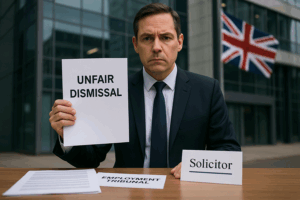What counts as unfair dismissal?

Losing your job can feel like a door slamming shut without warning, but the key used to open it has to be legal. In the UK, dismissal means the termination of an employment contract at the initiative of the employer. It must be based on a valid reason and follow a fair procedure. Otherwise, it may be considered unfair, unjustified or unlawful. Understanding your rights will enable you to protect yourself and act with full knowledge of the law. If you find yourself in a doubtful or contentious situation, it is strongly recommended that you consult an unfair dismissal solicitor.
KEY TAKEAWAY: Can an employer dismiss you without just cause or without due process?
No, any dismissal in the UK must be for a legitimate reason and follow a fair procedure, or t will be deemed unfair by an employment tribunal.
Find out in the following sections how to identify unfair dismissal, know your rights and take effective action to enforce them.
What is dismissal under UK employment law?
Dismissal refers to the termination of an employment contract by the employer, which can be based on various unfair dismissal reasons, including:
- Economic difficulties or organisational restructuring.
- Employee misconduct or breach of contract.
- Inability to perform the role effectively.
This termination must be justified and legally compliant to be valid.
Difference between dismissal, resignation and contract termination
It is important to distinguish between:
- Dismissal, initiated by the employer.
- Resignation, a voluntary decision by the employee.
- Fixed-term contract ending, which concludes naturally.
Each situation involves different rights and procedures.
In which cases is a dismissal considered unfair?
A dismissal is considered unfair when it occurs without a valid reason or without following the proper legal procedure under UK employment law. The Employment Rights Act 1996 protects employees with at least two years’ continuous service against unfair dismissal.
What are valid reasons for dismissal?
For a dismissal to be justified, the employer must rely on a genuine and fair reason, which may include:
- Conduct-related issues: This refers to employee misconduct such as breaches of company policies, unauthorised absences, or serious failure to perform job duties.
- Capability or performance: When an employee cannot carry out their role satisfactorily due to lack of skills, poor performance, or health-related reasons.
- Redundancy: This occurs when a role is genuinely no longer needed due to organisational restructuring or economic challenges.
- Statutory restriction: When continued employment would breach a legal requirement.
- Some other substantial reason (SOSR): This can cover behaviours detrimental to the business, like repeated conflicts, insubordination, or harassment.
For example, an employee may be dismissed for gross misconduct confirmed by a thorough internal investigation, or because their position is eliminated during a legitimate company restructuring.
What constitutes unfair dismissal?
A dismissal is unfair if:
- It is based on an invalid, illegal, or discriminatory reasons.
- The employer fails to follow a fair procedure, such as:
– Failing to hold a prior disciplinary meeting.
– Failing to conduct a reasonable investigation.
– Not providing a written dismissal notice.
– Denying the employee the opportunity to respond or defend themselves.
Common unfair dismissal examples include an employee dismissed for taking lawful leave entitlement without being given a chance to explain or without any investigation. Similarly, dismissals based on unsubstantiated personal disputes or rumours are also unfair dismissal examples.
Even a valid reason can result in unfair dismissal if proper procedural steps aren’t followed.
Grounds for unfair dismissal
The main grounds for unfair dismissal include:
- Lack of genuine reason for dismissal.
- Failure to follow ACAS Code of Practice.
- Dismissal falling outside the range of reasonable responses.
- Procedural failures during the dismissal process.
- Discrimination based on protected characteristics.
When is an automatic unfair dismissal?
Some dismissals are considered automatically unfair under UK employment law, regardless of how the dismissal was carried out or how long the employee has worked for the employer. In these cases, there is no requirement for two years of continuous service to make a claim at an employment tribunal.
What is an automatically unfair dismissal?
An automatically unfair dismissal occurs when the main reason for dismissal is the employee exercising a legal right or taking action protected by law. These dismissals are unlawful by nature and carry serious legal consequences for the employer.
A dismissal will be automatic unfair dismissal if it is due to the employee:
- Reporting a health and safety risk in the workplace;
- Taking or requesting statutory maternity, paternity, or parental leave.
- Refusing to work more than 48 hours per week under the Working Time Regulations.
- Whistleblowing (e.g. reporting illegal or unethical practices).
- Participating in lawful trade union activities.
- Asserting statutory rights or making a protected disclosure.
- Requesting to be paid the National Minimum Wage or asking for a written statement of employment terms.
For example, dismissing a worker because she is pregnant or on maternity leave is automatically unfair dismissal, even if the employer attempts to justify it with unrelated business reasons.
Likewise, if an employee is dismissed shortly after reporting financial misconduct or a safety breach, this could also be classed as an automatically unfair dismissal.
If an employee refuses to work excessive overtime beyond the legal limit and is dismissed as a result, the dismissal is likely to be an automatic unfair dismissal.
Different types of dismissal: Constructive dismissal, wrongful dismissal, and redundancy
The distinctions between various types of dismissal are paramount for employees to know their rights and potential remedies. Each type has different legal implications and procedures:
Constructive dismissal vs other types
Constructive dismissal occurs when an employee resigns due to a fundamental breach of contract by the employer, making continued employment impossible. The key difference is that the employee technically resigns, but the law treats it as if they were dismissed.
Key characteristics of constructive dismissal:
- Employee resigns due to employer’s serious breach.
- Breach must be fundamental to the contract.
- Employee must resign promptly without accepting the breach.
- No notice period required from employer.
- Can claim unfair dismissal if successful.
Wrongful dismissal vs unfair dismissal
Wrongful dismissal is fundamentally different from unfair dismissal and represents a breach of contract claim.
Important differences between unfair dismissal vs wrongful dismissal:
- Wrongful dismissal: Breach of contract (usually inadequate notice).
- Unfair dismissal: Lack of fair reason or fair procedure.
- Wrongful dismissal: No minimum service requirement.
- Unfair dismissal: Usually requires 2 years’ service.
- Wrongful dismissal: Focuses on contractual entitlements.
- Unfair dismissal: Focuses on fairness of process.
Redundancy vs unfair dismissal
Unfair dismissal vs redundancy distinctions are essential as redundancy can be a fair reason for dismissal when handled correctly.
Genuine redundancy characteristics:
- Business need to reduce workforce.
- Role genuinely no longer required.
- Proper consultation process followed.
- Fair selection criteria applied.
- Consideration of alternative employment.
When redundancy becomes unfair dismissal:
- Redundancy situation is not genuine.
- Unfair selection process.
- Inadequate consultation.
- Failure to consider alternatives.
- Discriminatory reasons behind selection.
Summary vs gross misconduct dismissal
Summary dismissal (instant dismissal without notice) is lawful only in cases of gross misconduct:
- Theft or fraud.
- Violence or serious safety breaches.
- Gross insubordination.
- Serious breach of confidentiality.
- Criminal conduct affecting employment.
When summary dismissal becomes unfair:
- Misconduct doesn’t amount to gross misconduct.
- Inadequate investigation conducted.
- No disciplinary hearing held.
- Employee denied right to respond.
Fixed-term contract expiry vs dismissal
Fixed-term contract expiry differs from dismissal:
- Contract ends naturally on specified date.
- No dismissal technically occurs.
- However, non-renewal may constitute dismissal
- Same unfair dismissal protections apply
- Redundancy rights may apply if role continues
When do I need a solicitor for an unfair dismissal case?
It can be beneficial to consult an employment solicitor in certain situations related to dismissal, namely:
- When the reason for dismissal is complex or disputed (for example, unfair dismissal or automatic unfair dismissal).
- If you are preparing for or defending a claim before an employment tribunal.
- To ensure that legal procedures and formalities are properly followed.
- When negotiating compensation or a settlement agreement with your employer.
- In unfair dismissal cases or contract-related disputes.
- If you have been dismissed without notice or in breach of your contract (wrongful dismissal).
A solicitor can provide advice, represent your interests, and improve your chances of a successful outcome.
FAQs
- How long do I have to claim after dismissal? You have three months minus one day from your dismissal date to submit a claim to an employment tribunal.
- Can I claim unfair dismissal during my probation period? Generally no, as you need two years’ service for ordinary unfair dismissal claims.
- What happens if I resign without giving notice? If you resign without giving contractual notice, your employer may claim damages for breach of contract.
Knowing your rights regarding dismissal is essential to protect yourself effectively against any contract termination. Don’t let an unfair situation jeopardise your professional future: stay informed, take action, and assert your rights.
Been dismissed and think it’s unfair?
Consult Qredible’s network of expert employment solicitors today to explore your options and secure the compensation you’re entitled to.
KEY TAKEAWAYS
- Unfair dismissal occurs when an employee is dismissed without a fair reason or proper procedure.
- Automatically unfair dismissal involves protected reasons where no minimum service is required.
- Constructive dismissal happens when an employee resigns due to a serious breach by the employer.
- Wrongful dismissal refers to breach of contract, often linked to lack of proper notice.
Articles Sources
- gov.uk - https://www.gov.uk/browse/employing-people/employee-rights
- acas.org.uk - https://www.acas.org.uk/unfair-dismissal
- legislation.gov.uk - https://www.legislation.gov.uk/ukpga/1996/18/contents
- citizensadvice.org.uk - https://www.citizensadvice.org.uk/work/leaving-a-job/dismissal/
- legislation.gov.uk - https://www.legislation.gov.uk/ukpga/2010/15/contents
Do you need a solicitor?
Find a solicitor on Qredible in just a few easy steps

















